
"Today I saw a slave become more powerful than the Emperor of Rome."
Gladiator was a good movie, but not Braveheart quality as far as period action epics go. Russell Crowe was the highlight (though I really think he should have gotten his Oscar for A Beautiful Mind the next year -I think most people agree it should have gone to Tom Hanks for Cast Away this year). Other good movies in 2000 were Erin Brockovich, Chocolat, and Crouching Tiger, Hidden Dragon (all were also nominated). I guess they are all about on par with each other, and are really good, but not Oscar caliber, movies. Just one of those years.
Gladiator follows General Maximus Decimus Meridius, "The general who became a slave. The slave who became a gladiator. The gladiator who defied an emperor."
Maximus is a popular, successful general in the Roman legion with no greater desire than to return home to his wife and son.
 |
| Emperor Marcus Aurelius and Maximus. |
Wow was he wrong. I mean, just spectacularly wrong.
Marcus Aurelius makes the boneheaded decision to call Commodus in for a little private conversation to break the bad news that he will not be Emperor. Does he think to let the Senate know his decision beforehand? Or the Generals? Or anybody other than Maximus, so that there is some evidence of his decision other than Maximus's word? No. No he does not. He pretty much leaves Maximus with a "Hey guys, actually he said I get to be in charge...Well no, no he didn't put anything in WRITING, but he really did say so" situation. To be fair, I guess he didn't quite anticipate just how badly Commodus was going to take the news.
Commodus breaks down in tears, and I almost felt sorry for him, except that I know he's an evil maniac:
"You wrote to me once, listing the four chief virtues: Wisdom, justice, fortitude and temperance. As I read the list, I knew I had none of them. But I have other virtues, father. Ambition. That can be a virtue when it drives us to excel. Resourcefulness, courage, perhaps not on the battlefield, but there are many forms of courage. Devotion, to my family and to you. But none of my virtues were on your list. Even then it was as if you didn't want me for your son."
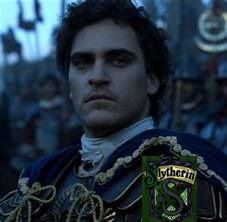
Okay, pause to consider: Does he sound to anyone else like a classic Slytherin? Sorry, but the presence of Richard Harris just put Harry Potter in my mind. Wikipedia states, "Slytherin house values ambition, cunning, leadership, and resourcefulness." Hmm? Hmm? Also, that they value pure-blood. Commodus wants to be with his sister (ew), he tells her, because "You will provide me with an heir of pure blood." Okay, moving on. I think I've made my point.
Commodus continues in tears: "I search the faces of the gods for ways to please you, to make you proud. One kind word, one full hug where you pressed me to your chest and held me tight would have been like the sun on my heart for a thousand years. What is it in me that you hate so much?...All I've ever wanted was to live up to you, Caesar. Father."
And right here, Marcus Aurelius twists the knife and manages to say the exact wrong thing, which basically signs his own death warrant (How did this man ever succeed as an Emperor? Talk about a serious case of foot in mouth syndrome, with a side of common sense deficiency.): "Commodus. Your faults as a son is my failure as a father." He says this like this is supposed to be comforting somehow...then gives his son a nice "I'm sorry you're worthless, it's my fault" hug. Can you really blame Commodus for wanting to smother him to death (which he promptly does)?
Commodus quickly pronounces himself Emperor. In sum, Marcus Aurelius screwed the pooch on this one.
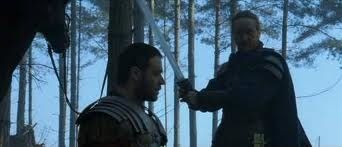
Then it's Maximus's turn to screw himself over. Commodus tells him, "Your Emperor asks for your loyalty, Maximus. Take my hand, I only offer it once." Now, the smart thing to do would be to take his hand, say congrats, get your family to safety, then go meet in secret with the Senators and Generals to gather allies and form a plan. Sadly, his sense of honor overwhelmed his brain temporarily. Knowing that Commodus murdered Marcus Aurelius, he refuses to take his hand, and storms off. Again, in his defense, I doubt he suspected exactly how cruelly Commodus would react. Commodus not only orders Praetorians (soldiers) to take Maximus out and have him killed, he also gives an order to have Maximus's wife and son crucified. This is pretty evil of Commodus. What is the point of painfully murdering Maximus's family other than to be sadistic? Maximus is an incredible fighter and escapes, though he is injured, but does not make it home in time to save his family, and collapses from anguish and from the pain of his wounds.
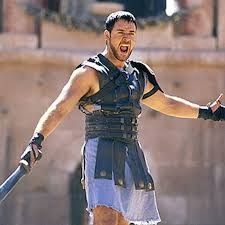 |
| "Are you not entertained?" |
When he wakes up, he has been taken into slavery. Apparently, back in the day, if you found someone lying injured on the road, it was kind of a finders keepers sort of deal. He is purchased by Proximo, an ex-gladiator who now owns gladiators. Maximus pretty quickly establishes himself as an awesome gladiator known as The Spaniard, befriends his fellow gladiators, and is taken under the wing of Proximo, who advises him: "Listen to me. Learn from me. I was not the best because I killed quickly. I was the best because the crowd loved me. Win the crowd and you will win your freedom."
 |
| Commodus meeting with the Senate. |
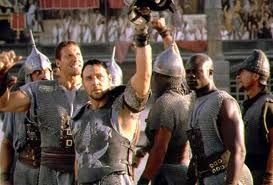
Proximo brings his troupe of gladiators, including Maximus, to Rome for the festivities. His men are sent into the arena to act as the barbarians in a reenactment of the Battle of Carthage, which means they are presumably being sent to their death; however, Maximus is a brilliant military strategist, and rallies the other gladiators: "Anyone here been in the army? You can help me. Whatever comes out of these gates, we've got a better chance of survival if we work together. Do you understand? If we stay together we survive." In a wonderful coupe, his gladiators win the fight. Commodus observes to the master of ceremonies, "My history's a little hazy Cassius, but shouldn't the Barbarians lose the battle of Carthage?"
Commodus strides out to meet the famous Spaniard, and asks his name:
Maximus: My name is Gladiator.
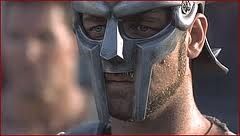 Commodus: How dare you show your back to me! Slave, you will remove your helmet and tell me your name.
Commodus: How dare you show your back to me! Slave, you will remove your helmet and tell me your name.Maximus: My name is Maximus Decimus Meridius, commander of the Armies of the North, General of the Felix Legions, loyal servant to the true Emperor, Marcus Aurelius. Father to a murdered son, husband to a murdered wife. And I will have my vengeance, in this life or the next.
Shocked to discover Maximus alive, Commodus wants to have him slain; however, the crowd loves Maximus, and screams for him to live. As Commodus is hosting these games for the purpose of winning favor with the people, he is forced to concede.

His sister, Lucilla, a lovely widow with a charming eight year old son, Lucius, sneaks out to meet with Maximus. They had had some sort of relationship in the past, and it's clear she still loves him. She is a likeable, strong character. Her father had told her before he was killed, "If only you had been born a man, what a Caesar you would have made," and it is clearly true. She is politically adroit, level-headed, clever, and brave. Since her brother took power, she has "been living in a prison of fear since that day," afraid of her brother killing her son if she does not toe the line, and afraid because he is clearly sexually interested in her, which naturally repulses her. Now she wants to help Maximus escape so that he can retake control of his army, defeat Commodus, and restore the Senate to power in order to return Rome to a Republic as her father wished. She and Senator Gracchus have a plan to make this happen, but it is foiled when Commodus discovers the plot.
 Now feeling betrayed by Lucilla, who he professes to love more than anyone, Commodus is more bloodthirsty than ever. Lucilla is his prisoner, threatened with the murder of her son if she doesn't do exactly what he says, or if she tries to commit suicide. He has decided to stage a fight between himself and Maximus in the arena. Of course, he's a coward, and doesn't intend to lose, so he stabs Maximus beforehand, then has them put Maximus's armor on so that no one can tell that he has been mortally wounded.
Now feeling betrayed by Lucilla, who he professes to love more than anyone, Commodus is more bloodthirsty than ever. Lucilla is his prisoner, threatened with the murder of her son if she doesn't do exactly what he says, or if she tries to commit suicide. He has decided to stage a fight between himself and Maximus in the arena. Of course, he's a coward, and doesn't intend to lose, so he stabs Maximus beforehand, then has them put Maximus's armor on so that no one can tell that he has been mortally wounded.This time Commodus has underestimated his foe, however, and even in his dying daze, Maximus manages to kill Commodus. Nobody seems to care much. The Senators and soldiers seem pretty relieved by the whole thing. When Maximus collapses and dies from his injury, Lucilla says: "Is Rome worth one good man's life? We believed it once. Make us believe it again. He was a soldier of Rome. Honor him." And they all pick him up and carry him out. Commodus is left there like a piece of trash, which, let's face it, he was.
 |
| "Go to them." |
 |
| Emperor Commodus is the guy on the floor. |
Anyway, it is a good movie, though, as Tyler says, a bit melodramatic (ex. Marcus Aurelius: "There was a dream that was Rome. You could only whisper it. Anything more than a whisper and it would vanish, it was so fragile."). A little much. Russell Crowe can pull it off and sound good, but some of the others not so much.
Worth watching, but not an Oscar winner in my mind.
 |
| The Colisum today. |
Not really important, but I should mention the lack of historical accuracy here. In fact, the succession issue seems to have been the opposite of how it was portrayed in the movie, according to Wikipedia: "Marcus gave the succession to his son Commodus, whom he had named Caesar in 166 and made co-emperor in 177. This decision, putting an end to the series of "adoptive emperors", was highly criticized by later historians since Commodus was a political and military outsider." The article does go on to describe Commodus as "an extreme egotist with neurotic problems," so at least that part was true. And he apparently did like to appear in the arena as a gladiator, and "always won since his opponents always submitted to the emperor," and he was assassinated, though not by Maximus (he is a fictional character). Lucilla was really his sister, and was executed for conspiring to have him assassinated. This particular conspiracy (it seems there were many -Commodus's mistress also tried to poison him), totally failed, because it seems the chosen assassin had been watching too many plays, and thought he needed to deliver a good pre-assassination zinger: "As he burst forth from his hiding place to commit the deed, Quintianus’ nephew boasted to Commodus "Here is what the Senate sends to you", giving away his intentions before he had the chance to act. Commodus's guards were faster than Quintianus, and the would-be assassin was overpowered and disarmed without injuring the emperor."


No comments:
Post a Comment